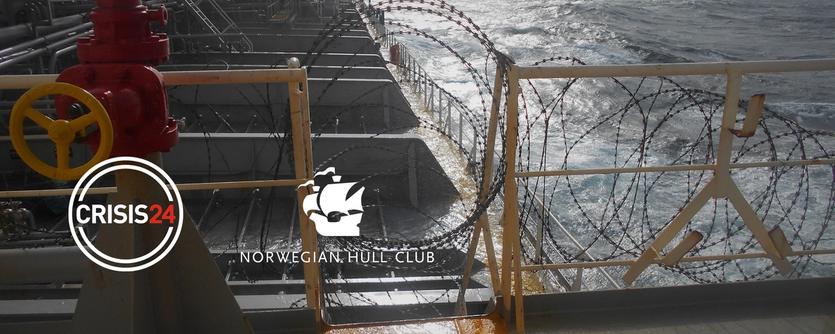
Somali piracy threat returns and demands focus - insight from Crisis24
Given the increase in piracy incidents we are witnessing, Norwegian Hull Club is increasing its focus accordingly. For this newsletter, The Club requested that its strategic partner Crisis24 - one of the world's leading integrated security risk management experts – share recent case studies, along with recommended actions based on best practice and experience.
Crisis 24 writes:
In the last months of 2023, piracy activity within the Indian Ocean and Gulf of Aden conducted by Somali pirate action groups (PAGs) made global headlines once again. This followed a significant period of inactivity that led many to believe the threat posed by such groups was a thing of the past.
Underlying factors
Despite the reduction in incidents since the height of Somali pirate activity between 2008 and 2013 due, in part, to a concerted international naval maritime security operation targeting the phenomenon at sea, the underlying factors on land remained unchanged. Endemic political instability, widespread insecurity and a chronic lack of viable economic opportunity have remained, with groups likely biding their time until offshore opportunities became viable again. This viability has likely come about following the reduction in the High Risk Area (HRA) designation for the Indian Ocean from 1 January 2023, and then the major maritime security focus shift in October towards the increasing number of attacks on vessels in the Red Sea following the Israel-Gaza war.
Hijacked
At the time of writing, at least two PAGs are believed to be in operation along Somalia’s northern and eastern coastlines, with several fishing vessels/dhows hijacked in recent months. These vessels are used as motherships to launch operations further offshore, as Somali groups look to capitalise on international naval attentions turned to Yemen, as well as the chaos brought about by the Houthis' sustained attacks on international commercial shipping which have resulted in vessels holding positions, diverting courses, as well as global logistics and supply chains being disrupted. Several commercial vessels have been successfully boarded and hijacked by these groups, with at least one incident resulting in the prolonged kidnap of international seafarers in December 2023..
Operators, insurers and naval personnel must now refocus on a maritime piracy threat not witnessed in over a decade.
Crew kidnapped after cutting equipment left on deck
Crisis24 supported a maritime piracy case in which a commercial vessel far offshore had been attacked and boarded by a PAG. In their haste to secure themselves within the vessel's citadel, the crew had failed to lock away heavy-duty cutting equipment used for maintenance duties. Given the vessel's distance from shore, and therefore from naval forces able to come to the rescue in time, the PAG had sufficient time to utilise the vessel's own cutting equipment against it. The citadel was successfully opened by the PAG and the crew inside kidnapped. They were later released following protracted negotiations.
Missing crew member meant delay for naval forces
In another case supported by Crisis24, a vessel in the Indian Ocean was boarded by a PAG. The majority of crewmembers reached the vessel's citadel area successfully; however, one crewmember was unaccounted for. As a result, naval forces nearby were hesitant to board, as the missing crewmember may have been harmed by the pirates or could be at risk in any ensuing boarding operation. The crewmember was able to make contact with the citadel later and naval forces subsequently boarded. The pirates, during this time, had left the vessel.
Recommended actions
1. Ideally, early detection and then raising the alarm (both on board and on the guard net)
2. Secure external doors into the super structure once decks are cleared of crew
3. Non-essential crew to move into the citadel, skeleton crew to remain on the bridge until boarding confirmed and then withdraw to citadel
4. If possible, secure the engine room door from the inside with locks and likewise the citadel door, thus creating layers between the crew and the pirates
5. Secure any tools / equipment that the pirates might be able to use to gain access into the citadel
6. Maintain communications with head office throughout
7. Stay away from the citadel door, ideally behind solid equipment in case any gunfire penetrates the doors / walls
8. Do not stand directly below air vents / funnels as these can be utilized by pirates to shoot down (in some vessels)
9. Remain in the citadel until instructed to leave by head office and only when it is certain that the pirates have left the vessel
10. If international Navy board the vessel, remain inside the citadel until they instruct that it is safe to leave; consider the use of passwords to confirm it is in fact Navy.
Norwegian Hull Club wishes to thank Crisis24 for sharing its valuable knowledge and experience. To discover more about Crisis24 and the work they do, log on to their website here.